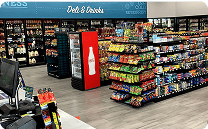In This article
Cloud storage is a technology that allows any data, including video surveillance footage, to be saved on servers hosted in remote data centers and accessed through the Internet. For businesses and industrial users of security camera systems, cloud storage provides an alternative to traditional on-premises storage solutions like Digital and Network Video Recorders, offering benefits in terms of scalability, accessibility, and data protection.
In a typical cloud storage setup, security cameras are connected to a network and configured to continuously send recorded video or, based on motion events, to a cloud server. That server is usually managed by a third-party managed services provider (MSP) that handles all backend infrastructure, including maintenance, backups, security, and uptime guarantees.
Advantages of Cloud Storage
There are several distinct advantages of cloud storage in surveillance environments:
- Remote Access: With internet access, users can access and view live or recorded footage using a web portal or mobile app from any location.
- Scalability: Storage capacity can be easily adjusted as your needs grow, without additional hardware.
- Redundancy and Reliability: Cloud providers typically store data in multiple geographically diverse data centers, minimizing the risk of data loss due to hardware failure or local disasters.
- Simplified Maintenance: The cloud provider manages updates, backups, and infrastructure, reducing the burden on in-house IT teams.
- Enhanced Security: Reputable providers offer strong encryption, access controls, and activity monitoring to help keep video footage secure.
Modern cloud storage platforms often integrate AI-powered video management systems (VMS) that enable advanced features such as object recognition, motion detection, vehicle tracking, and facial recognition. Storing footage in the cloud means these analytics can be applied across large volumes of video data without relying on the limited processing power of local systems.
Some cloud services offer intelligent alerts, searchable video archives, and behavior-based tagging, which are especially useful in larger environments like warehouses, campuses, or multi-site businesses.
Cloud Storage Considerations
While cloud storage offers compelling benefits, there are also factors to consider when evaluating its use in a surveillance context:
- Bandwidth Requirements: Uploading high-resolution video footage to the cloud can place heavy demands on your internet connection, particularly if multiple cameras are recording continuously.
- Subscription Costs: Typically operates on a subscription or pay-as-you-go model, which can be more cost-effective than on-premises storage for some businesses but more expensive for others, depending on video retention policies and data usage.
- Compliance and Data Sovereignty: In regulated industries such as finance or healthcare, it’s essential to ensure the cloud provider meets relevant compliance standards (e.g., SOC 2, ISO 27001) and that data is stored in approved geographic regions.
Many security systems today offer hybrid models, where footage is stored locally for a short period and automatically backed up to the cloud for longer-term retention. This provides redundancy while optimizing network usage and reducing latency during live viewing.
Ultimately, cloud storage allows organizations to extend their security capabilities without local hardware limitations. It supports distributed teams, enables faster incident response, and reduces the risks associated with physical storage failures. Cloud storage is increasingly preferred for businesses that prioritize flexibility, scalability, and modern security infrastructure.
How DTiQ Helps You Make the Most of Cloud Storage
Cloud storage is critical in modern surveillance by enabling secure, scalable, and remote access to video footage. DTiQ’s Cloud Archive allows the storage, access, and analysis of high-quality video from multiple locations, without the constraints of on-premises systems. With intelligent video, real-time alerts, and powerful analytics built into our 360iQ platform, DTiQ helps businesses reduce risk, meet compliance requirements, and make smarter operational decisions across every location. To learn more, visit our website.




























